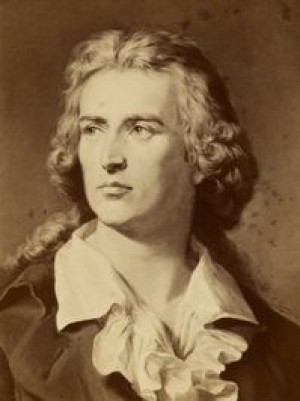Johann Christoph Friedrich von Schiller was a German poet, philosopher, historian, and playwright. Next to Goethe (and sometimes even more so than him), Schiller is considered to be Germany's most important classical playwright. Critics have noted his innovative use of dramatic structure and his...
show more
Johann Christoph Friedrich von Schiller was a German poet, philosopher, historian, and playwright.
Next to Goethe (and sometimes even more so than him), Schiller is considered to be Germany's most important classical playwright. Critics have noted his innovative use of dramatic structure and his creation of new forms, such as the melodrama and the bourgeois tragedy. He wrote his first play, Die Räuber (The Robbers), while still enrolled at an elite military academy in Stuttgart, where he studied medicine. The play dramatizes the conflict between two aristocratic brothers: the elder leads a group of rebellious students into the Bohemian forest where they become Robin Hood-like bandits, while the younger brother, schemes to inherit his father's considerable estate. The play's critique of social corruption and its affirmation of proto-revolutionary republican ideals astounded its original audience. Schiller became an overnight sensation. Later, he would be made an honorary member of the French Republic because of this play.
Among Schiller's most notable plays in addition to The Robbers are Intrigue and Love (Kabale und Liebe), a tragic love story in the vein of Shakespeare's Romeo and Juliet that attacks absolutism and bourgeois hypocrisy and was adapted as an opera by Giuseppe Verdi under the name Luisa Miller, a trilogy based on the life and career of Thirty Years' War general Albrecht von Wallenstein, the likewise historical dramas Mary Stuart (Maria Stuart) – portraying Elizabeth I's cousin and rival as a misunderstood martyr –, The Maid of Orleans (Die Jungfrau von Orleans) and William Tell (Wilhelm Tell), both styled as biographies of important freedom fighters; as well as, significantly, Schiller's first historical drama Don Carlos, whom Schiller similarly portrays as a republican figure in his attempt to free Flanders from the despotic grip of his father, King Phillip II. The play's probably most famous speech, however, is not delivered by its eponymous hero but by his friend, the Marquess of Posa, who voices Schiller's own belief in personal freedom and democracy when he exhorts the king to grant freedom of thought ("Geben Sie Gedankenfreiheit!").
Schiller also wrote many philosophical papers on ethics and aesthetics. During the last seventeen years of his life (1788 – 1805), he struck up a productive, if complicated, friendship with already famous and influential Johann Wolfgang von Goethe. They co-founded the Weimar Theater, which became the leading theater in Germany; and their collaboration helped lead to a renaissance of drama in Germany. They also frequently discussed issues concerning aesthetics, and Schiller encouraged Goethe to finish works he left as sketches. This relationship and these discussions led to a period now referred to as Weimar Classicism. They also worked together on Xenien (Xenias), a collection of short satirical poems in which both Schiller and Goethe challenge opponents to their philosophical vision.
For his achievements, Schiller was ennobled in 1802 by the Duke of Weimar. His works were received enthusiastically not only in Germany but also abroad, particularly in Italy and Russia. His 100th birthday in 1859 was celebrated all over Europe, as well as in the United States. By 1867, his publisher Cotta had sold 2.4 million copies of his works worldwide. Replicas of Weimar's 1857 joint monument to Goethe and Schiller have been erected in San Francisco, Milwaukee, Cleveland, Syracuse and Shanghai. In September 2008, Schiller was voted by the audience of the TV channel Arte as the second most important playwright in Europe after William Shakespeare.
show less

